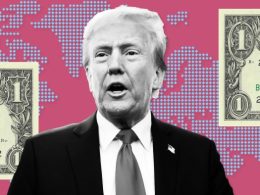Unlock the US Election Countdown newsletter for free
The stories that matter on money and politics in the race for the White House
TotalEnergies’ chief executive has urged Donald Trump not to axe climate rules if he wins the election, warning that taking a “wild west” approach to regulating fossil fuels would provoke a backlash against the oil industry.
Patrick Pouyanné told the Financial Times that if the former US president pressed ahead with pledges to tear up rules governing methane and other emissions it would torpedo the sector’s reputation and fuel opposition.
“I prefer to have good regulations in the US, for example, in methane I prefer the EPA [Environmental Protection Agency] to be stringent . . . I am not in favour of the wild west,” he said.
“My view is that this will not help the industry, but on the contrary it will demonise, and then the dialogue will be even more antagonised.”
The comments from Pouyanné, whose France-based company is one of the biggest global oil producers, come as the industry considers the implications of a possible Trump victory over Kamala Harris in Tuesday’s US presidential election.
Trump has pledged to “rescind every one of Joe Biden’s industry-killing” regulations and withdraw from the 2015 Paris agreement — steps he says will “unleash American energy”, which is already at record levels of production.
The oil industry has been an important source of fundraising for the Republican candidate as many executives oppose environmental restrictions that they say will hinder investment. A handful have publicly endorsed him, including Harold Hamm, the billionaire founder of Continental Resources.
In private, however, many leaders have expressed reservations about Trump’s policies, including plans to impose punishing tariffs on imports and gut the Inflation Reduction Act, Biden’s signature climate legislation.
Even if he wins the presidency, much of Trump’s ability to enact his plans could be limited by Congress and the courts. Some industry leaders expressed scepticism that the regulatory bonfire would come to pass.
“I think there’s a very low likelihood the US becomes a wild west of deregulation,” said Mike Wirth, chief executive of US supermajor Chevron.
He told the FT: “Based on 42 years in this industry, I’ve seen regulation move in one direction. Sometimes it moves faster, sometimes it moves slower, but I don’t think that we’re at risk of some sort of chaotic outcome of a deregulatory period of time.”
Trump has been particularly scathing about the IRA, which he has dubbed the “green new scam”, vowing to rescind all unspent funds issued under it.
But oil companies including Chevron and US rivals ExxonMobil and Occidental Petroleum are tapping into the $370bn in green tax breaks and subsidies available through the legislation to support investments in technologies including hydrogen and carbon capture and do not want the law repealed.
Some executives are hoping the flow of the majority of IRA funds into Republican congressional districts would prompt Trump’s party to temper his ambitions to kill it.
“There’s a lot in the IRA that’s helping to support projects across the country, which also helps to support economic growth and job growth,” Kathy Mikells, Exxon chief financial officer, told the FT. “That gives a lot of people a lot of incentive to stand behind the IRA.”
Biden’s regulatory agenda would be easier to unpick, however, including tough new rules and penalties forcing the industry to curb methane leaks.
Most larger oil companies are investing in new technology to limit emissions of the planet-warming gas and have backed global efforts to slash them by at least 30 per cent by 2030 from 2020 levels.
But many smaller operators are opposed to the rules, arguing they lack the financial firepower to adhere to them, and want Trump to repeal them — as he did with regulations introduced by Barack Obama during his first term.
Pouyanné said such a move would leave the industry exposed to attacks by climate groups and give the industry “again a bad reputation”.
Oil companies had accepted environmental rules in the past covering greenhouse gas emissions, air and water quality and should do so again and face up to the challenge of climate change, he said.
In 2021 Total quit the American Petroleum Institute saying the French group’s climate policies — support for the Paris agreement and belief in carbon pricing — did not align with those of the industry lobby group.
“We can produce fossil fuels with lower emissions and we have the technology,” he said. “I count on my large and big US peers to convince the rest of the industry.”
Source link









